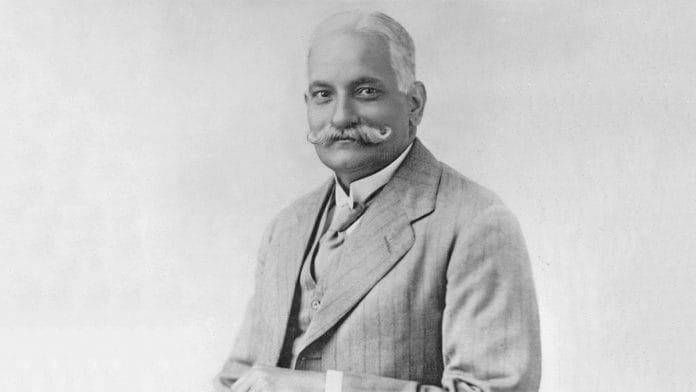New Delhi: A prominent lawyer, a freedom fighter and father of Independent India’s first Prime Minister Jawaharlal Nehru — Motilal Nehru was all of this, but also a lot more.
Much before the Constituent Assembly of India even came into existence, Motilal drafted the famous ‘Nehru report’ which laid down the principles of a democratic system with adult suffrage, constitutional and legal rights.
On his 158th birth anniversary, ThePrint remembers one of the country’s most eminent leaders.
Family life
Pandit Motilal Nehru was born on 6 May 1861 in Agra, Uttar Pradesh, to a Kashmiri Brahmin family. He spent his childhood in Khetri, Rajasthan where his elder brother Nandlal was the ‘Diwan’. Motilal was taught lessons in Arabic, Persian and English as he completed his schooling from Government High School, Kanpur. He proceeded to get a law degree from Muir Central College, Allahabad (now Prayagaj).
Motilal married as a teenager, but lost both his wife and first born son during childbirth. Soon, he also lost his brother Nandlal and was forced to take care of his extended family comprising his brother’s widow and their 7 children. He was just 25 at the time.
He married a second time to Swarup Rani Kaul, and in 1889, she gave birth to a son, Jawaharlal. The couple also had two daughters — Vijayalakshmi Pandit and Krishna Nehru.
Also read: Sardar Patel wanted RSS to be merged into Congress but Nehru & Golwalkar stood in way
Early career
Motilal started practising law in 1883 at Kanpur and then joined the High Court Bar in Allahabad as an advocate.
“Pandit Motilal was famous for the strength and directness of his advocacy”, said the book Pandit Motilal Nehru: His Life and Work, edited and compiled by U.C. Bhattacharya and S.S. Chakravarty.
As Motilal grew in his legal career, his standard of living also improved dramatically. He was among the richest Indians later in his life.
But Motilal wasn’t much involved in politics in his early career, unlike his Allahabad-based contemporary Madan Mohan Malaviya.
However, the clash between the moderates and the extremists factions within the Congress brought him into the political arena. He chose the moderate faction, alongside Surendra Nath Banerjee and Gopal Krishna Gokhale.
Political career
At the age of 46, Motilal presided over a provincial conference of the moderates held at Allahabad in 1907.
“She (Britain) has fed us with the best food that her language, her literature, her science, her art and, above all, her institutions could supply. We have lived and grown on that wholesome food for a century and are fast approaching the age of maturity,” said Motilal in a speech at Allahabad a year later.
Following the Morley-Minto reforms of 1909, Motilal became a member of the United Provinces Legislative Council.
According to Pandit Motilal Nehru: His Life and Work, Motilal was “uncompromising in his attitude” and “boldly spoke out his mind” during political discussions and debates.
He also actively participated in the Home Rule movement started by Annie Besant in 1916. The Pioneer newspaper conferred him the title ‘Brigadier General of the Home Rule League’.
Motilal also launched a daily newspaper, The Independent, in 1919, facing severe financial losses while starting out. He was also elected to preside over the Amritsar Congress session in the same year.
He went on to lend his support to, and participate in, the Mahatma Gandhi-led non-cooperation movement. Its impact on him was great, as he renounced his Western lifestyle and took a turn towards khadi. He also gave up on his legal career.
A year later he even established his own political outfit, Swaraj Party, along with C.R Das. Swaraj, in Hindi, means ‘self-rule’. The primary aim of the party was to destabilise the British Raj through anti-government agitation within the chambers of the Central Legislative Assembly. It was seen as a political wing of the Congress.
However, the party was disbanded by 1927 as it was unable to achieve its objectives.
Nehru report and salt satyagraha
In 1928, Motilal chaired the committee that prepared the Nehru report — a draft constitution for an Independent India — which was written in response to the formation of the Simon Commission.
The report, written in a legal style comprising 22 chapters and 87 articles, claimed dominion status for India, and included sections on fundamental rights, among others. It was rejected by Britain.
Following the rejection of the report, Motilal continued his struggle against the British rule by participating in the Civil Disobedience Movement in 1930. The same year, he gave up his residence Anand Bhawan to the Congress party for use as its headquarters.
Despite his poor health, Motilal participated in the movement and travelled to Jambasur, Gujarat, to support Gandhi’s salt satyagraha. He was jailed for a couple of months and was released in light of his poor health.
Motilal died a few months later on 6 February 1931.
Also read: Not just Nehru, even sister Vijaya Lakshmi had strong reasons to decline UNSC permanent seat







Chetan hi, all muslims in India are converts. No muslim ever bring this subject up. If nehru was a converted one that was two centuries ago. In the next century there will be substantial conversions in to Hindus. We cannot carry on keeping them down and keep bringing this subject. It was nice to have a leader of his caliber in the movement to independence.
Mr Ratnadeep chaudhary,
You are the one who does not call his own father a father, truth nehrus are no kashmiri pandit rather they are converted & infact father of moti lal nehru is gayasuddin gazi